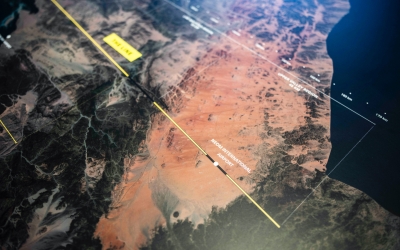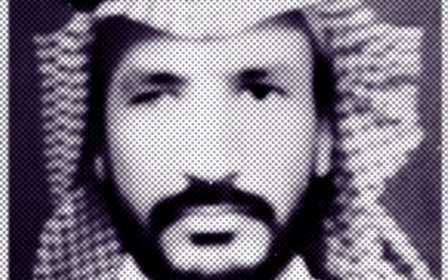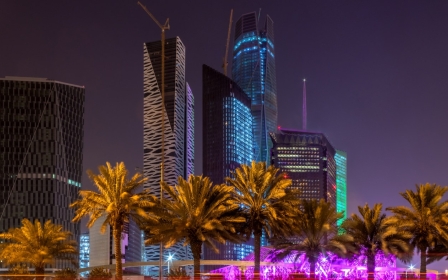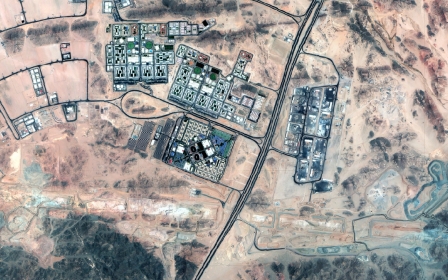Neom: Saudi officers 'ordered to kill people' who resisted eviction in Neom and Qatif

Saudi security officers were ordered to use lethal force to kill people who resisted eviction to make way for the megacity Neom and redevelopments in the Qatif region, a former Saudi intelligence officer has told Middle East Eye.
In a report first published by the BBC on Thursday, dissident colonel Rabih Alenezi - who sought asylum in London last year - said he was ordered to evict members of the Howeitat tribe in northwestern Saudi Arabia's Tabuk province in 202o by killing anyone who resisted eviction.
The Saudi government has been accused of forcibly displacing members of the Howeitat tribe, who have lived for centuries in Tabuk, to make way for the $500bn city.
Alenezi said he swerved the mission in Tabuk by feigning illness, but it went ahead, and resulted in the death of Abdul Rahim al-Huwaiti, a tribal activist who refused to leave his home.
Speaking to MEE on Thursday, Alenezi said he was made aware of the "kill order" in January 2020 on Saudi Arabia’s internal intelligence software.
New MEE newsletter: Jerusalem Dispatch
Sign up to get the latest insights and analysis on Israel-Palestine, alongside Turkey Unpacked and other MEE newsletters
“I studied security in the US, in Phoenix. I was taught we don’t use bad tools, we don’t kill people, unless there’s a necessity… unless there’s extreme danger,” he said.
“In the case of the Howeitat tribe, they are not criminals. Why didn’t [Crown Prince Mohammed bin Salman] ask us to negotiate with them?"
'As for the leaders of the demonstrations or those who resist and refuse to leave the neighbourhood planned to be demolished, lethal force was used against them'
- Saudi colonel Rabih Alenezi
Alenezi said that the order was also used in Awamiya, a town in the eastern Qatif region, which is home to many of Saudi Arabia’s Shia minority.
In 2016, the kingdom announced plans to demolish and redevelop the al-Musawara neighbourhood of Awamiya.
A year later, several people were left dead after reported gun battles between Saudi forces and armed members of the Shia minority.
Alenezi said that an "order to kill" was issued in the region, and was used against unarmed protest leaders.
“My friends in intelligence who went to al-Qatif… they said they received orders to use lethal force," he told MEE.
“Demonstrations were suppressed with rubber bullets and tear gas. As for the leaders of the demonstrations or those who resist and refuse to leave the neighbourhood planned to be demolished, lethal force was used against them.”
At the time, activists said that Saudi security forces killed several civilians in populated areas of al-Musawara, including a three-year-old.
Alenezi said he was ordered to spy on Shia Saudis in Qatif and monitor their activities, but swerved that mission too by stating that he had planned a holiday.
"I couldn't refuse and say I didn't want to go. If I said that I could've been killed. So I refused by lying to them," he said.
Threats against his life
Alenezi said there had been several threats against his life since he sought asylum in London last year, and a bounty put on his head.
In March 2023, when Saudi Interior Minister Prince Abdulaziz bin Saud met with Suella Braverman, then UK home secretary, he received a call inviting him to the Saudi embassy in London to meet the minister.
He said the call was via encrypted messaging app Telegram, and was from a former friend of his in the Saudi intelligence service.
The man said Alenezi would be offered $5m (£4m) to attend the meeting. The former colonel refused.
“Maybe they were trying to kill me, or maybe they were trying to bribe me,” he said. “I prefer to live as a poor person rather than rich if the money comes from bad people.”
According to Saudi media, a bounty of $250,000 (£200,000) was placed on the former colonel’s head by the Saudi royal court.
He said he has received threats through social media and was followed by a Saudi man several months ago in west London.
“At first he was trying to talk to me and advise me. I said ‘thank you, bye’ and then he followed me,” Alenezi said.
He informed London’s Metropolitan Police of the physical and social media threats, and has since been told by UK authorities to take various precautions.
UK government pitches for Neom business
Alenezi’s latest revelations about a shoot-to-kill policy in Neom come just days before a UK government-backed trade delegation heads to Riyadh to pitch for lucrative Saudi megaprojects.
The Great Futures conference on 14 and 15 May will showcase opportunities for UK firms to invest in Saudi schemes, including Neom.
MEE asked the Department for Business and Trade if it would continue to encourage British investment in Neom in light of Alenezi’s comments on the use of lethal force against tribespeople. The department did not respond by the time of publication.
James Lynch, of rights group Fair Square, told MEE that the revelations about use of lethal force in Tabuk was “disturbing”.
“Allegations that there was effectively orders to use lethal force, where people were resisting evictions, are really deeply alarming, and should be taken very seriously… by the British government and international businesses,” he said.
He said the UK government needed to think about the implications of encouraging businesses to invest in a project that has “such a wide range of human rights violations, connected to it”.
The BBC report on Thursday stated that one British company, Solar Water Plc, had pulled out of a $100m project with Neom over concerns about the displacement of Saudi tribespeople.
"It's extremely shameful that the British government is supporting this project which is killing people," said Alenezi.
This article is available in French on Middle East Eye French edition.
Middle East Eye delivers independent and unrivalled coverage and analysis of the Middle East, North Africa and beyond. To learn more about republishing this content and the associated fees, please fill out this form. More about MEE can be found here.






